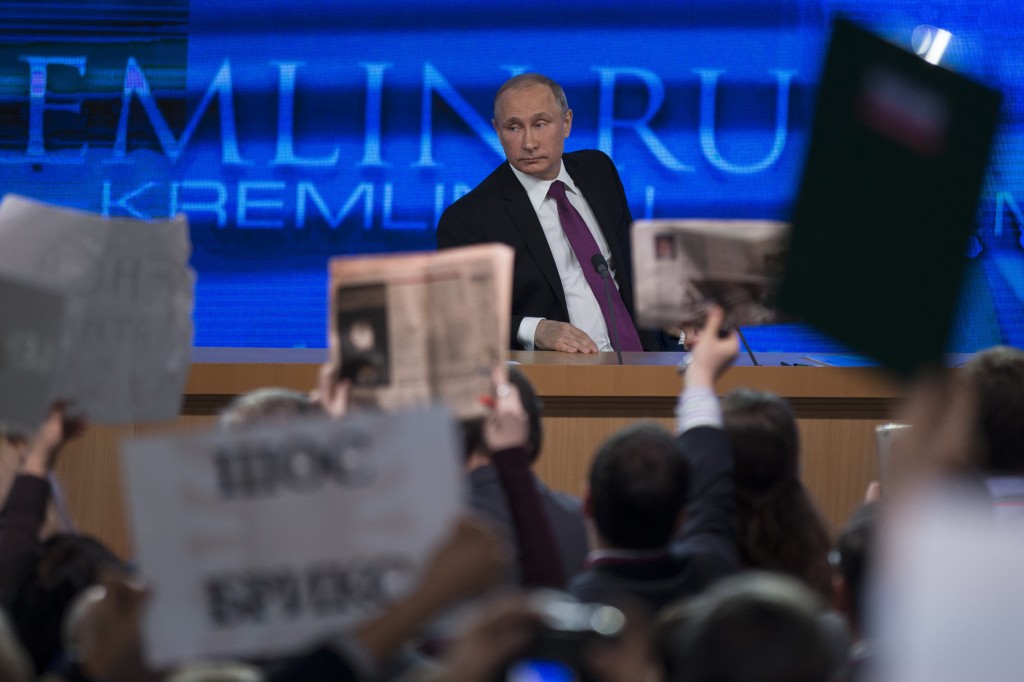- California Assembly OKs highest minimum wage in nation
- S. Korea unveils first graphic cigarette warnings
- US joins with South Korea, Japan in bid to deter North Korea
- LPGA golfer Chun In-gee finally back in action
- S. Korea won’t be top seed in final World Cup qualification round
- US men’s soccer misses 2nd straight Olympics
- US back on track in qualifying with 4-0 win over Guatemala
- High-intensity workout injuries spawn cottage industry
- CDC expands range of Zika mosquitoes into parts of Northeast
- Who knew? ‘The Walking Dead’ is helping families connect
Russian crisis worries Korea

Journalists raise hands and posters and papers to attract attention, as Russian President Vladimir Putin, background, listens to a question, during his annual news conference in Moscow, Russia, Thursday, Dec. 18, 2014. The Russian economy will rebound and the ruble will stabilize, Russian President Vladimir Putin said Thursday at his annual press conference, he also said Ukraine must remain one political entity, voicing hope that the crisis could be solved through peace talks. (AP Photo/Pavel Golovkin)
By Choi Kyong-ae
Moscow’s possible default on its foreign debt or a moratorium on its repayment could deal a severe blow to the Korean economy, analysts said Wednesday.
Any major currency-related risks in Russia could pose a threat to the financial markets of emerging countries. There may be capital flight from Russia and other emerging markets as investors seek stable assets such as the dollar. Korea is not an exception, they said.
Russia currently has about $678.4 billion in foreign debt. It will have maturing debts of $160 billion by December of next year. On top of that, the country expects foreign capital outflows will reach $134 billion this year alone if the Russian currency falls further, according to the Korea Center for International Finance (KCIF).
“Given Russia had a five-year low of $416 billion in foreign exchange reserves as of Dec. 5, an additional fall in the value of the ruble could reduce the value of the reserves. Hence uncontrollable capital flight from Russia,” KCIF analyst Park Mi-jung said.
Russia is likely to have three options early next year it can choose from — capital control, a moratorium or default. Russia is expected to declare a moratorium if its control on capital flows does not work, analysts said.
“If Russia’s currency woes spread to other emerging markets such as Brazil, Indonesia, Thailand and Venezuela, there could be a much bigger banking crisis in Asia, including Korea,” said Oh Jeong-geun who teaches economics at Konkuk University.
As of the end of September, Korea’s 11 banks — including the Korea Development Bank, Woori Bank and the Export-Import Bank of Korea — had 1.4 trillion won ($1.36 billion) extended to Russian financial institutions and companies, according to the Financial Supervisory Service (FSS).
Analysts urged the government to check on the current status of foreign exchange reserves and draw up a contingency plan in the case of a default by Russia.
“We do not expect any big impact on Korean banks from Russia’s currency crisis as their exposure accounts for only 1.3 percent of their overall external credit offerings of $108.3 billion,” an FSS official said. “We are closely monitoring foreign-exchange reserves and capital flows in the markets to prepare in case of a default by Russia following the ruble’s plunge.”
Korea had $363 billion in foreign-exchange reserves in November.
Russia’s ongoing currency crisis is the result of declining oil prices and western sanctions imposed in response to Moscow’s interference in the Ukraine. Russia may declare a moratorium on external debt early next year, IHS Global Insight said.
The ruble has lost nearly 50 percent of its value this year. Less than a week after the Central Bank of Russia raised its key interest rate by 100 basis points, the bank took an extraordinary step to raise the rate another 650 basis points to stave off downward pressure on the nose-diving interest rate and the ensuing impact on domestic prices, IHS said.
“The course of the ruble will depend more on developments on the oil-price and economic-sanction fronts than on the path of the policy interest rate, despite another 650-point increase,” IHS analyst Chuck Movit said.















